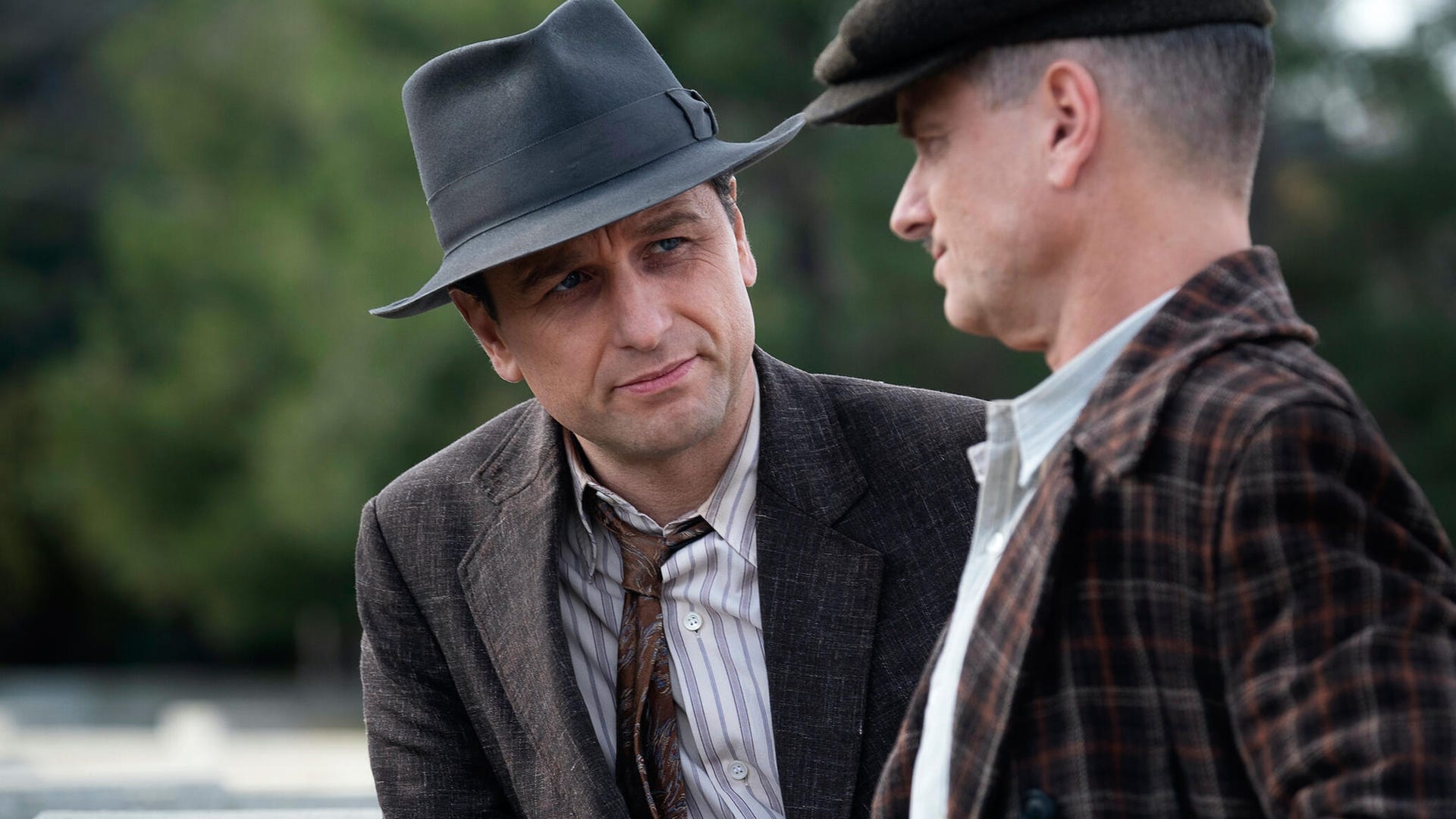Join or Sign In
Sign in to customize your TV listings
By joining TV Guide, you agree to our Terms of Use and acknowledge the data practices in our Privacy Policy.
It's Totally OK That Perry Mason Was Just a Gorgeous, Well-Acted Long Episode of Law & Order
We're firmly in the post-prestige era of television
Perry Mason (Matthew Rhys) did it! He solved the case of Charlie Dodson's murder, even if he couldn't prove it in court, just like we all thought he would. In the unsurprising Season 1 finale of HBO's Perry Mason, the investigator-turned-lawyer was able to deadlock the jury in the murder trial of Emily Dodson (Gayle Rankin), which might not be an innocent verdict, but it's sure as heck a lot better than a big G on Emily's head. (For the record, Stephen Root's Maynard Barnes said he would be retrying the case... Season 2 perhaps?)
The victory for Perry and Emily was somewhat bittersweet because the real perpetrators, corrupt cop Joe Ennis (Andrew Howard) and Radiant Assembly of God elder Eric Seidel (Taylor Nichols), never faced justice and were never branded as guilty. (However, both received karmic justice when they were discreetly murdered.) This is the slightly more complicated shades-of-grey approach to HBO's Perry Mason, the modern twist on the original, in which guilt was absolute when Perry got the bad guys to confess on the stand. In fact, no one came out of this season totally guilty -- not Perry for paying jurors, breaking and entering, or tampering with evidence; not Della (Juliet Rylance) for stealing ledgers from the church; not Ennis and Seidel for baby murdering; not Alice (Tatiana Maslany) or Birdy (Lili Taylor) or anyone else in the church for fraud.
8 Shows Like Perry Mason to Watch Next
The only thing guilty in Perry Mason is the show itself: guilty of being a crime procedural with a story that would fit on basic cable or even network television if it weren't for all the expensive set pieces and big-name talent. Let's not sugarcoat anything; by the time a riot broke out at the cemetery when baby Charlie's body was being exhumed so that Alice could resurrect the kid to get Emily off the hook for murder (yikes), the story, as many pre-release reviews warned, had stalled. But Perry Mason remained immensely watchable -- I enjoyed the heck out of it -- because it mixed the gloss of what we're used to from a traditional prestige drama with the comfort of a long episode of a procedural series. It's a prototype for the post-prestige era of television that we're embarking on, spurred by Netflix's deluge of content that has every other competitor scrambling to catch up.
For HBO, which was, along with AMC and a few others, the progenitor of the prestige drama, Perry Mason is an evolution of a brand that is feeling the pressure to ramp up content. HBO had long been a champion of "less is more," delivering fewer shows, but shows that we could count on to be really, really good. It's a model that worked well before streaming (read: Netflix) turned the industry into a content farm in perpetual spring. Early in 2019, HBO's new AT&T overlords announced that in order to keep up, HBO's output would increase significantly, essentially blowing up the model that had worked for HBO for years. Now with HBO Max, HBO is scaling up in magnitudes, and we're seeing that with HBO Max originals and HBO programming on Mondays (one of HBO's best shows in years, I May Destroy You, airs Monday nights; that would never have happened two years ago).
The Best Shows and Movies to Watch This Week: Surviving Jeffrey Epstein, Project Power
Perry Mason is what you get out of that. It looks and feels like an Emmy winner but is structured like a procedural that's been on television for decades. The first season was never too challenging, but it was always intriguing. If the Radiant Assembly of God storyline got too boring -- which it did, frequently -- there was always Tatiana Maslany's intense performance or Alice beautifully tripping out in a metaphorical boat to keep your attention. Perry Mason dipped its toe in social issues, but never went below the knee, as though it had seen one too many prestige wannabes get sucked under and drown. In Perry Mason, we're seeing the influence of prestige dramas -- The Sopranos, Breaking Bad, and, particularly in Perry Mason's case, True Detective -- without any jibber-jabber about time as flat circles. Rust Cohle's ramblings required recurring rewinds and echoed in your skull; Perry Mason was out of your head as soon as the credits rolled.
At some point, HBO stopped billing Perry Mason as a limited series and announced in July that it would be coming back for a second season. The reason is simple: This is the type of show that this new, more prolific HBO needs now. A show that can compete come Emmy time, maybe not in the Best Drama category but certainly in the acting and production fields, while running on the tried-and-true engine of procedural detective television. Too often, as HBO found out with Game of Thrones, TV series are measured by their finales and the conclusions of epic stories. With Perry Mason, we knew the season's ending before the credits rolled on the first episode because, like the original, we were witness to the crime, and the show was about watching Perry figure it out. It's hard to be too disappointed in an ending when the show tells us what the ending is early on.
Perry Mason is now streaming on HBO Max.

Matthew Rhys and Shea Whigham, Perry Mason
Merrick Morton/HBO